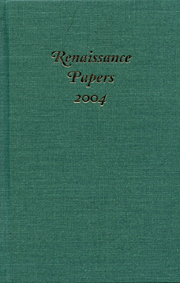Book contents
- Frontmatter
- Contents
- Renaissance Papers
- All Ovids Elegies, the Amores, and the Allusive Close of Marlowe's Hero and Leander
- Revisiting Shakespeare's Eliot
- “'Tis Rigor and Not Law”: Trials of Women as Trials of Patriarchy in The Winter's Tale
- Crossing Wits: Donne, Herbert, and Sacramental Rhetoric
- Love and Power: The Rhetorical Motives of John Donne's 1622 Sermon to the Virginia Company
- Crashaw, Catholicism, and Englishness: Defining Religious Identity
- Addendum
- Beyond “no end”: The Shape of Paradise Lost X
All Ovids Elegies, the Amores, and the Allusive Close of Marlowe's Hero and Leander
Published online by Cambridge University Press: 12 September 2012
- Frontmatter
- Contents
- Renaissance Papers
- All Ovids Elegies, the Amores, and the Allusive Close of Marlowe's Hero and Leander
- Revisiting Shakespeare's Eliot
- “'Tis Rigor and Not Law”: Trials of Women as Trials of Patriarchy in The Winter's Tale
- Crossing Wits: Donne, Herbert, and Sacramental Rhetoric
- Love and Power: The Rhetorical Motives of John Donne's 1622 Sermon to the Virginia Company
- Crashaw, Catholicism, and Englishness: Defining Religious Identity
- Addendum
- Beyond “no end”: The Shape of Paradise Lost X
Summary
“The verse oft, with allusion, as supposing a full-knowing reader, lets slip.”
—Michael Drayton, Poly-olbion (1613)In the close of Marlowe's Hero and Leander, several dark chords are sounding. There, describing his lovers' final interaction, Marlowe makes several allusions to All Ovids Elegies, his English translation of Ovid's libertine Amores. Recollections of specific words and phrases from All Ovids Elegies 1.5 and 1.13 signal the allusions. Recalling Elegy 1.5, Marlowe underscores the threat of violence that shadows Hero and Leander's final scene; echoing Elegy 1.13, he contrasts Hero and Leander's experience of daybreak with the pathos that attends the elegiac lovers' parting at dawn. Each recollection is complex in and of itself. In the end, however, this complexity is deepened by a second set of more implicit recollections. For the “full-knowing reader,” a reader like those learned members of the Inns of Court and Chancery who made Ovidian poems like Hero and Leander so enormously popular in the 1590s, Marlowe's allusions ultimately recall Ovid's original Latin text. This second set of recollections, with unvarying pressure, endows Hero and Leander's final images of love with tension. Marlowe incorporates in the close of Hero and Leander only those phrases from All Ovids Elegies whose meanings reinterpret, and thereby practice violence upon, images of love centered in the Amores. Calling attention to love's compromise and even to its cancellation, Marlowe's layered allusions finally expose Hero and Leander's love to be empty of joy and tenderness.
- Type
- Chapter
- Information
- Renaissance Papers 2004 , pp. 1 - 16Publisher: Boydell & BrewerPrint publication year: 2005



